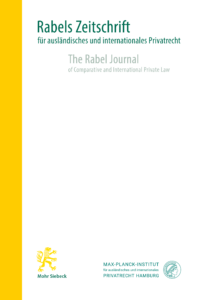Views
Measure twice, cut once: Dutch case Presta v VLEP on choice of law in employment contracts
Presta v VLEP (23 june 2023) illustrates the application of the CEJU’s Gruber Logistics (Case C-152/20, 15 July 2021) by the Dutch Supreme Court. In order to determine the law applicable to an individual employment contract under article 8 Rome I, one must compare the level of protection that would have existed in the absence of a choice of law (in this case, Dutch law) with the level of protection offered by the law chosen by the parties in the contract (in this case, the laws of Luxembourg), thereafter, the law of the country offering the highest level of employee protection should be applied.
U.S. Supreme Court Renders Personal Jurisdiction Decision
This post is by Maggie Gardner, a professor of law at Cornell Law School. It is cross-posted at Transnational Litigation Blog.
The U.S. Supreme Court yesterday upheld the constitutionality of Pennsylvania’s corporate registration statute, even though it requires out-of-state corporations registering to do business within the state to consent to all-purpose (general) personal jurisdiction. The result in Mallory v. Norfolk Southern Railway Co. re-opens the door to suing foreign companies in U.S. courts over disputes that arise in other countries. It may also have significant repercussions for personal jurisdiction doctrine more broadly. Read more
The New Saudi Civil Transaction Act and its Potential Impact on Private International Law in Saudi Arabia
The Kingdom of Saudi Arabia (KSA) has recently enacted a new Civil Transactions Law (Royal Decree No. M/199, dated June 16, 2023). The law will enter into force on December 16, 2023, 180 days after its enactment (hereinafter referred to as “the new law”). This law has been rightly described as “groundbreaking” because, prior to the enactment of the new law, there has been no codification of civil law in the Kingdom, and civil law issues have traditionally been governed by the classical rules of Islamic Sharia according to the teachings of the prevailing school of fiqh (religio-legal jurisprudence) in the Kingdom (Hanbali School). Like most of the civil law codifications in the region, the new law focuses mainly on the so-called “patrimonial law,” i.e., property rights and obligations (contractual and non-contractual). Family relations and successions are dealt with in a separate law, which was previously enacted in 2022 and entered into force the same year (Personal Status Act, Royal Decree No. M/73 of 9 March 2022, entered into force on June 18, 2022).
News
The FAMIMOVE project ends today – A summary of its achievements

Today (31-December 2024), FAMIMOVE 2.0. is coming to an end after having accomplished all of its goals and created a solid network of experts. The project’s full name is Families on the Move: The Coordination between international family law and migration law and is an international project co-funded by the European Commission under the JUST-2022-JCOO program. For more information, click here.
The project aimed to improve the protection of migrant children and families by bringing actual practice more in line with EU goals and values, such as the protection of fundamental rights and best interests of the child. It sought to provide more effectiveness to EU objectives through a better coordination of instruments in overlapping fields, such as Regulations in private international law in family law matters and migration law rules.
Out now: Issue 4/2024 of RabelsZ
 The last issue of RabelsZ 2024 has just been released. It contains the following contributions (which are all available Open Access: CC BY 4.0):
The last issue of RabelsZ 2024 has just been released. It contains the following contributions (which are all available Open Access: CC BY 4.0):
Holger Fleischer & Simon Horn, Unternehmensskandale und skandalgetriebene Regulierung: Die Stavisky-Affäre als Prüfstein (Corporate Scandals and Scandal-Driven Regulation: The Stavisky Affair as Touchstone), pp. 648–693, https://doi.org/10.1628/rabelsz-2024-0062 Read more
Extension of deadline (to 10 January 2025) for Call for Papers for Special Issue of the Journal of Sustainable Development and Policy on the theme, “Private International Law and Sustainable Development in Africa”
Edited by:
Dr Chukwuma Okoli, University of Birmingham, United Kingdom
Dr Eghosa O. Ekhator, University of Derby, United Kingdom
Professor Veronica Ruiz Abou-Nigm, University of Edinburgh, United Kingdom
Professor Ralf Michaels, Max Planck Institute for Comparative and International Private Law, Germany
OVERVIEW
The Journal of Sustainable Development Law and Policy invites scholarly articles for publication in a special issue focusing on the theme “Private International Law and Sustainable Development in Africa.” This is an area with limited scholarship in Africa, as most research has traditionally emphasized substantive laws, often neglecting the critical role of private international law in sustainable development. Interested researchers should consider themes such as the ones explored in Michaels/Ruiz Abou-Nigm/Van Loon (eds.) (2021): The Private Side of Transforming our World – UN Sustainable Development Goals 2030 and the Role of Private International Law. Proposals should emphasise private international law and sustainable development issues that are of particular relevance to the African context. Read more


